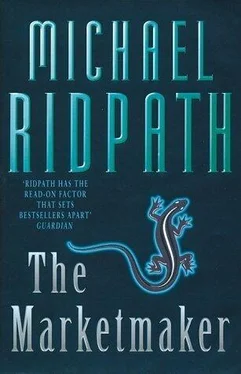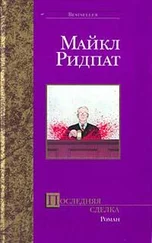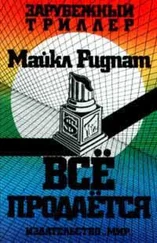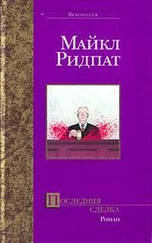‘OK, compañeros, we’re up to a billion two,’ he said. You could hear the collective intake of breath. This was big, even by Dekker’s standards. ‘The bonds are still sticking at sixty-seven. Bloomfield Weiss have been happy to sell us all we can buy, until just before the market closed last night in New York. Then they suddenly went quiet. We’ll see what happens this morning.’
There were grins all round
‘Now what about this Mexican deal?’
‘The price talk seems to be ten and a quarter per cent,’ said Miguel. ‘And Bloomfield Weiss sound confident.’
‘Well, we need to win this one,’ said Ricardo.
Charlotte coughed slightly.
Ricardo held up his hand. ‘Don’t worry, Charlotte. I know Mexico’s looking a little precarious right now. And this isn’t the time I would choose to sell two billion dollars of their debt. But we’re splitting the deal with US Commerce, which reduces our exposure. And today might just be the day we finish off Bloomfield Weiss in Latin America for good. So we go in at nine and three-quarters and we win the deal. OK?’
I saw Jamie wince. He would have to sell this Mexican deal. Even I realized it would be difficult at that yield. He half opened his mouth and then closed it.
‘Good.’ Ricardo rubbed his hands. ‘Now, let’s make some money.’
There was a lot of noise and activity in the room that day. But only two phone calls mattered. The first came through for Ricardo at eleven thirty. It was Bloomfield Weiss’s head trader. It was rare for head traders to talk to each other like this, but he had no choice. He wanted to know where Dekker would offer seven hundred million dollars of the Argentine Discounts.
The room knew instantaneously what was happening. We were all quiet, all watching Ricardo.
‘Seventy-two.’
A pause.
Then Ricardo put down the headset. ‘Seven hundred million Argentine Discounts sold at seventy-two!’
A huge cheer met his announcement. In that second, thirty-five million dollars flowed into Dekker Ward’s profit and loss account.
The second call was much later, about seven o’clock London time. Dekker Ward and US Commerce Bank had been awarded the mandate to sell two billion dollars of five-year United Mexican States eurobonds at a yield of nine and three-quarters per cent. The issue was to be launched the following Wednesday.
The Marketmaker had shut Bloomfield Weiss out of his domain. And we had a lot of bonds to sell.
The Brady battle tempted Lord Kerton out to Canary Wharf to inspect his victorious troops. He was Chairman of Dekker Ward, a post he had effectively inherited from his father twelve years previously. He and Ricardo had come to an arrangement. Ricardo had independence, his own offices in Canary Wharf, and fifty per cent of the profits he generated for himself and his people. Kerton had the other fifty per cent, and the satisfaction of seeing Dekker Ward grow to be the most successful brokerage firm in London. He and Ricardo treated each other with a mixture of civility and circumspection.
They strolled round to where I was sitting with Jamie.
‘Jamie you know,’ said Ricardo. ‘But I don’t think you’ve met Nick Elliot, one of our new hires. He was the one who worked out where Bloomfield Weiss were borrowing their bonds.’
My chest swelled with pride. I couldn’t help it.
Lord Kerton shook my hand, and looked me in the eye. He was a tall, athletic man of about forty, with fair hair that curled over his ears and down the nape of his neck. He wore a double-breasted suit with a broad stripe. ‘Jolly well done, Nick. Good to have you on board.’
‘I’m enjoying it here.’
‘Excellent, excellent,’ he said, and then he was off, looking around curiously, as if he would suddenly discover the key to our extraordinary profitability lurking under a desk, or behind a screen, if he only looked hard enough. He was gone within half an hour.
‘That was a bit like a royal visit,’ I said to Jamie.
He laughed. ‘That’s about it. Kerton is just like a monarch. A useful figurehead with no power, who knows that if he makes a nuisance of himself he’ll be overthrown. He’s no fool. He realizes if he leaves Ricardo well alone he can just sit back and watch the profits roll in. Nice job, if you can get it.’
The phone light flashed. It was Alejo. He sold his Argentine Discounts back to Jamie for a four-point profit. Although most of the conversation was in Spanish, Alejo didn’t sound very grateful. Chris Frewer had been much more enthusiastic that morning.
‘Alejo’s a miserable sod, isn’t he?’ I said.
‘Yeah,’ said Jamie. ‘But he does some pretty big trades so I don’t complain. You’ve seen what we’ve done over the last few weeks.’
It was true. Alejo had been in and out of the market many times in size. Big size. Like two hundred million sometimes. A customer well worth keeping sweet, however grumpy he was.
It only took me a few minutes to pedal the mile or so from the office to the bar where I had agreed to meet Isabel. It wasn’t exactly a secret assignation. Isabel just didn’t want to draw attention to us by leaving together, or by meeting up at the more convenient Corney and Barrow, a wine bar in Canary Wharf that some of the Dekker crowd used on a Friday night.
The bar was big and noisy, converted from a warehouse during the yuppification of the Docklands. It was full of young men and women in suits drinking designer beers. Some of them were on their way home west from Canary Wharf, and some were the new inhabitants of the area who had moved into the speculatively priced waterfront apartments. No sign of a true East Ender of course.
Even though I was wearing one myself, I still felt uneasy surrounded by this sea of suits. I was more used to the pubs around Bloomsbury or Kentish Town, where scruffier men and women talked in quieter tones over pints of bitter.
Isabel arrived a few moments after me. We hadn’t spoken much during the week. I had spent most of the time at Jamie’s desk, and Isabel had been very busy.
I was still pretty sure she really was nervous of starting a relationship with someone from work. This I could understand, even though I didn’t necessarily like it. But I knew, with Isabel, there was no point in pushing my luck.
I ordered two extortionately priced bottles of Budvar, which seemed to be the local beverage of choice, and we perched on stools at the end of a crowded table.
‘That was a long week!’ I said, taking a swig of the malt-laden beer. ‘In fact, so was last week. I feel like I’ve been at Dekker a year already. Is it always like this?’
‘Basically yes,’ Isabel said. ‘There’s always something going on.’
‘Are you working on another favela deal?’
‘Yes. São Paulo sound as if they might be interested.’ She sighed. ‘But it’s hard to motivate myself to put in all that work after what happened to the Rio deal.’
‘It must be,’ I said.
‘I still can’t believe it!’ Isabel’s face reddened with indignation. ‘Or I can believe it of Ricardo. That’s just the trouble. OK, so I blew it. I lost the deal. But that’s no reason to destroy it for the people of Rio!’
‘I agree,’ I said. ‘I spoke to Ricardo about it on the plane.’
‘What did he say?’
‘He said that he knew the favela deal was a good thing. But he had to teach Bloomfield Weiss a lesson. He had no choice.’
‘Bah!’
‘I find it difficult to get used to,’ I said. ‘What I was doing before had a purpose that had nothing to do with making money. We were teaching something important. And we were trying to understand a bit more about literature and language. We were paid just enough to be able to do that. But now everything we do is to make money for us and our firm. So if it makes money we do it, if it doesn’t, we don’t, and if it makes money for a competitor, we destroy it.’
Читать дальше












